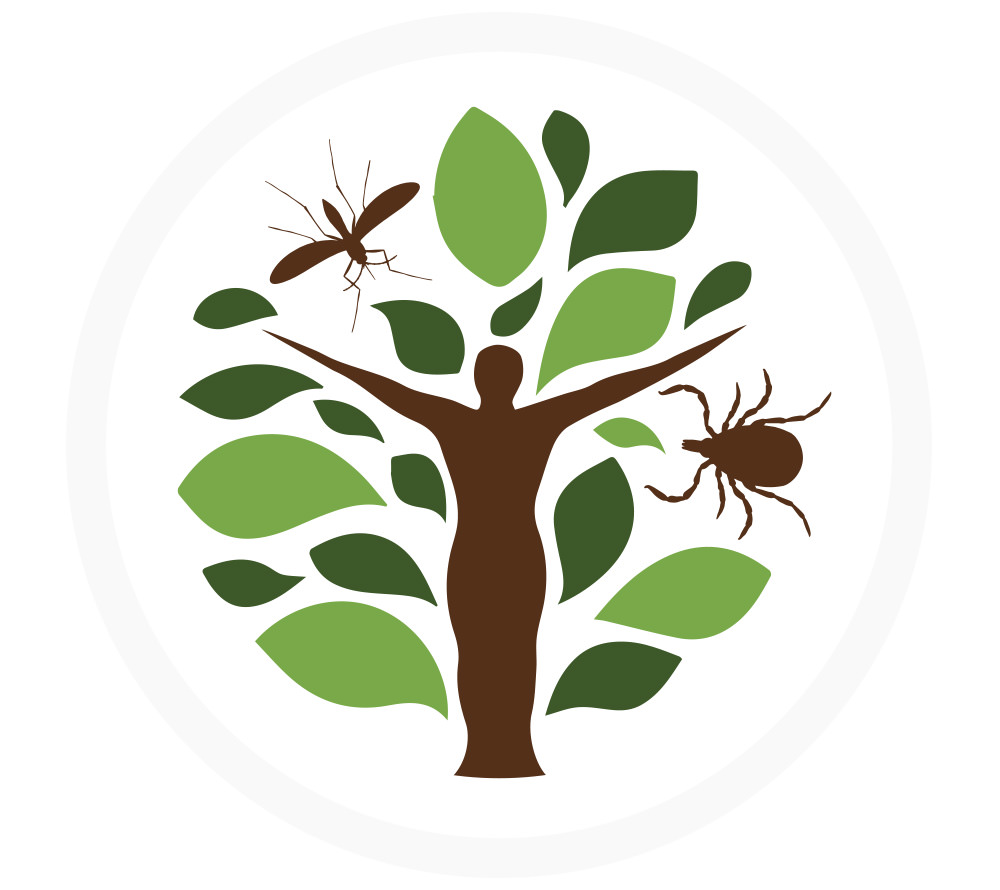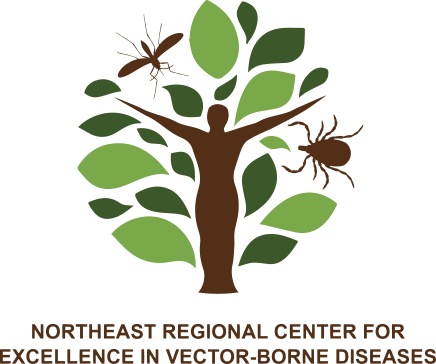Research Focus Area 3: Vector-Pathogen Interactions
Vector competence is the ability of arthropods to acquire, maintain, and transmit disease-causing agents to other animals. Researchers working in this area are testing the vector competence of mosquito and tick populations in the Northeast for a variety of pathogens important to human health. Our team is focused on serious immediate and future threats in our region, including West Nile virus, Borrelia burgdorferi (Lyme disease bacteria), Eastern equine encephalitis virus, Powassan virus, Zika virus, chikungunya virus, and dengue virus.
PROJECT AREA: Assessment of Vector Competence of Local Populations for Endemic and Potentially Invasive Pathogens
Work in this area will use experimental studies to assess risk of localized virus transmission of both endemic pathogens (West Nile virus, Eastern equine encephalitis virus, Cache Valley virus, Powassan virus, Borrelia burgdorferi) and potentially invasive pathogens (Zika virus, dengue virus, chikungunya virus, yellow fever virus, Mayaro virus, Heartland virus) with a focus on vectors currently experiencing range expansion in the Northeast. Vector competence studies will be completed with vector populations either directly acquired from the field or recently colonized, and a range of genetically diverse pathogens. These experiments, in conjunction with other ongoing projects in NEVBD, will allow us to assess all variables affecting vectorial capacity (longevity, blood feeding rates, competence and extrinsic incubation period) in a controlled setting, which will provide a comprehensive assessment of risk.
Lead Institutions: Columbia University, Connecticut Agricultural Experiment Station, New York State Department of Health
Project Investigators:
- Philip Armstrong, ScD, Connecticut Agricultural Experiment Station
- Douglas Brackney, PhD, Connecticut Agricultural Experiment Station
- Alexander Ciota, PhD, Wadsworth Center Arbovirus Laboratory, New York State Department of Health
- Constentin Dieme, PhD, Wadsworth Center Arbovirus Laboratory, New York State Department of Health
- Rohit Sharma, PhD, Connecticut Agricultural Experiment Station
- Andrea Gloria-Soria, PhD, Connecticut Agricultural Experiment Station
- Laura Kramer, PhD, Wadsworth Center Arbovirus Laboratory, New York State Department of Health
Project-Related Publications:
- Armstrong PM, Ehrlich H, Magalhaes T, Conway PJ, Bransfield A, Misencik M, Gloria-Soria A, Warren JL, Andreadis TG, Shepard JJ, Foy BD, Pitzer VE, and Brackney DE. 2020. Successive blood meals enhance virus dissemination within mosquitoes and increase transmission potential. Nature Microbiology. 5(2):239-247. doi:10.1038/s41564-019-0619-y
- Brackney, D.E., Correa, M.A., and D.W. Cozens. 2020. The impact of autophagy on arbovirus infection of mosquito cells. PloS Neglected Trop. Dis. 14(5):e0007754. doi:10.1371/journal.pntd.0007754
- Ciota AT, Bialosuknia SM, Zink SD, Brecher M, Ehrbar DJ, Morrissette MN, Kramer LD. 2017. Effects of Zika virus strain and Aedes mosquito species on vector competence. Emerging Infectious Diseases 23(7):1110-17. doi:10.3201/eid2307.161633
- Correa MA, Matusovsky B, Brackney DE, Steven B. 2018. Generation of axenic Aedes aegypti demonstrate live bacteria are not required for mosquito development. Nature Communications 9:4464. doi:10.1038/s41467-018-07014-2
- Kuo L, Jaeger AS, Banker EM, Bialosuknia SM, Mathias N, Payne AF, Kramer LD, Aliota MT, Ciota AT. 2020. Reversion to ancestral Zika virus NS1 residues increases competence of Ae. albopictus. PLOS Pathogens. 16(10):e1008951. doi:10.1371/journal.ppat.1008951
- Onyango MG, Attardo GM, Taylor Kelly R, Bialosuknia SM, Stout J, Banker E, Kuo L, Ciota AT, Framer LD. 2020. Zika virus infection results in biochemical changes associated with RNA editing, inflammatory and antiviral responses in Aedes albopictus. Frontiers in Microbiology. 11:559035. doi:10.3389/fmicb.2020.559035
- Onyango MG, Ciota AT, Kramer LD. 2020. The vector-host-pathogen interface: the next frontier in the battle against mosquito-borne viral diseases? Frontiers in Cellular and Infection Microbiology. 10:564518. doi:10.3389/fcimb.2020.564518
- Rochlin I, Faraji A, Healy K, Andreadis TG. 2019. West Nile virus mosquito vectors in North America. Journal Medical Entomology 56(6):1475-90. doi:10.1093/jme/tjz146
- Sanchez-Vargas I, Harrington LC, Black IV WC, Olson KE. 2019. Analysis of salivary glands and saliva from Aedes albopictus and Aedes aegypti infected with chikungunya viruses. Insects 10(2):39. doi:10.3390/insects10020039
PROJECT AREA: Impact of Temperature and the Microbiome on Pathogen Transmission
Project Overview: In addition to competence, the transmission potential of vector populations (vectorial capacity) is largely influenced by both longevity and blood feeding behavior. We will evaluate the longevity, blood feeding rates, and fecundity of targeted mosquito and tick species under different natural temperature regimes with and without exposure to virus. Experimental infections will be completed at both currently relevant temperature regimes, and temperature regimes mimicking forecasted increases based on current climate models. Vector populations will be exposed to infectious blood meals and both vector competence and life-history traits will be evaluated following exposure. These experiments, in conjunction with other ongoing projects in NEVBD, will allow us to assess all variables affecting vectorial capacity (longevity, blood feeding rates, competence and extrinsic incubation period) in a controlled setting, which will provide a comprehensive assessment of risk.
Lead Institutions: Connecticut Agricultural Experiment Station, New York State Department of Health
Project Investigators:
- Philip Armstrong, ScD, Connecticut Agricultural Experiment Station
- Alexander Ciota, PhD, Wadsworth Center Arbovirus Laboratory, New York State Department of Health
- Laura Kramer, PhD, Wadsworth Center Arbovirus Laboratory, New York State Department of Health
- Goudarz Molaei, PhD, Connecticut Agricultural Experiment Station
- Maria Onyango, PhD, Wadsworth Center Arbovirus Laboratory, New York State Department of Health
Project-Related Publications:
- Ciota AT, Keyel AC. 2019. The role of temperature in transmission for zoonotic arboviruses. Viruses, Special Issue “Transmission Dynamics of Insect Viruses” 11(11):1013. doi:10.3390/v11111013
- Hyde, J., Correa, M.A., Hughes, G.L., Steven, B., and D.E. Brackney. 2020. Limited influence of the gut microbiome on the transcriptional profile of female Aedes aegypti mosquitoes. Sci Rep. 10(1):1-12. doi:10.1038/s41598-020-67811-y
- Onyango MO, Bialosuknia SM, Payne AP, Mathias N, Kuo L, Ciota AT, Kramer LD. 2020. Increased temperatures reduce the vectorial capacity of Aedes mosquitoes for Zika virus. Emerging Microbes. 9(1):67-77. doi:10.1080/22221751.2019.1707125
PROJECT AREA: Characterization of the Genetic Diversity and Structure of Vector and Virus Populations
Project Overview: Work in this project area focuses on the exploration of the genetic diversity of mosquito and tick vectors and the pathogens they transmit in the Northeast to better understand the origins, re-introduction, and gene flow of species in our region. Characterization of the genetic diversity and structure of vector and virus populations will help us understand the extent to which genetic variability correlates to variability in pathogen transmission and local prevalence of both vectors and vector-borne pathogens. Field samples for these studies are obtained from regional public health and vector control partners, as well as from the ongoing surveillance efforts in our applied research agenda.
Lead Institutions: Connecticut Agricultural Experiment Station, New York State Department of Health
Project Investigators:
- Alexander Ciota, PhD, Wadsworth Center Arbovirus Laboratory, New York State Department of Health
- Andrea Gloria-Soria, PhD, Connecticut Agricultural Experiment Station
- Laura Kramer, PhD, Wadsworth Center Arbovirus Laboratory, New York State Department of Health
- Goudarz Molaei, PhD, Connecticut Agricultural Experiment Station
Project-Related Publications:
- Bialosuknia SM, Tan Y, Zink SD, Koetzner CA, Maffei JG, Halpin RA, Muller R, Novatny M, Shilts M, Fedorova NB, Amedeo P, Das SR, Pickett B, Kramer LD, Ciota AT. 2019. Evolutionary dynamics and molecular epidemiology of West Nile virus in New York State: 1999-2015. Virus Evolution 5(2):vez020. doi:10.1093/ve/vez035.
- Eastwood F, Shepard JJ, Misencik MJ, Andreadis TG, Armstrong PM. 2020. Local persistence of novel regional variants of La Crosse virus in the Northeast USA. Parasites Vectors 13, 569. doi:10.1186/s13071-020-04440-4
- Gloria-Soria, A., Soghigian, J., Kellner, D. and Powell, J.R. 2019. Genetic diversity of laboratory strains and implications for research: The case of Aedes aegypti. PLoS Neglected Tropical Diseases 13(12):e0007930. doi:10.1371/journal.pntd.0007930.
- Oliver J, Tan Y, Haight JD, Tobere KJ, Gall WK, Zink SD, Kramer LD, Campbell SR, Howard JJ, Das SR, Sherwood JA. 2020. Spatial and temporal expansions of Eastern equine encephalitis virus and phylogenetic groups isolated from mosquitoes and mammalian cases in New York State from 2013 to 2019. Emerging Microbes & Infections. 9(1). doi:10.1080/22221751.2020.1774426
- Soghigian J, Andreadis TG, Molaei G. 2018. Population genomics of Culiseta melanura, the principal vector of Eastern equine encephalitis virus in the United States. PLoS Neglected Tropical Diseases 12(8):e0006698. doi:10.1371/journal.pntd.0006698
- Soghigian J, Gloria-Soria A, Robert V, Le Goff G, Failloux, AB, Powell JR. 2020. Genetic evidence for the origin of Aedes aegypti, the yellow fever mosquito, in the southwestern Indian Ocean. Molecular Ecology. 29:3595-3606. doi:10.1111/mec.15590

